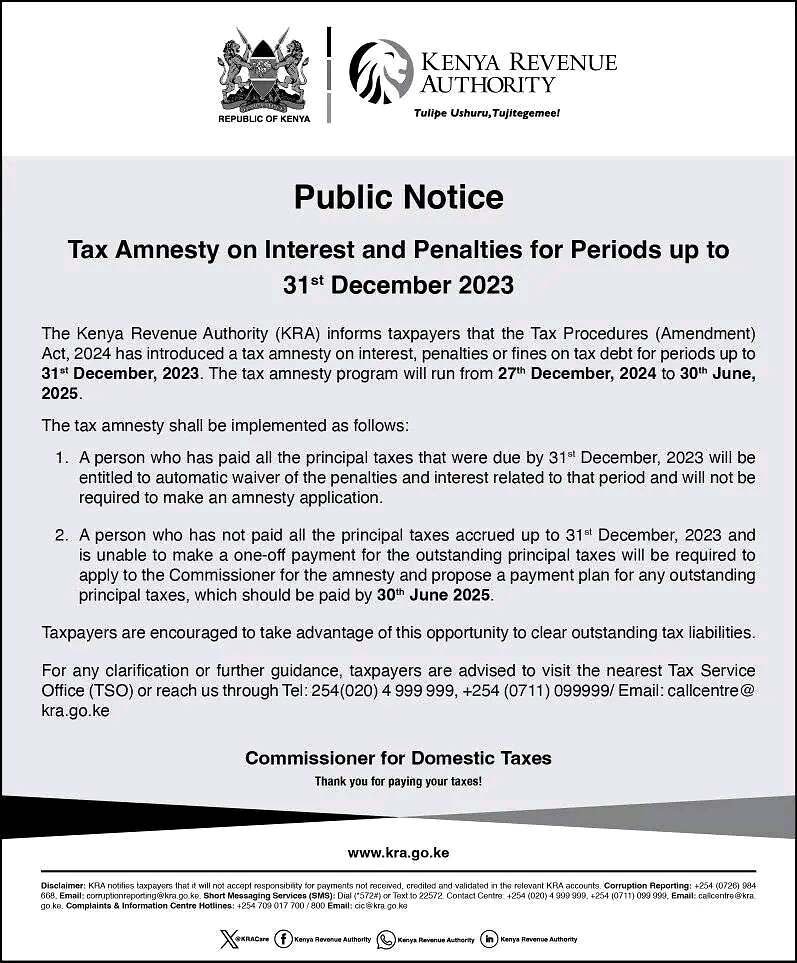
Understanding Tax Amnesty: What It Means for Kenyan Taxpayers
Tax amnesty is a governmental initiative that temporarily allows taxpayers to settle their outstanding tax liabilities without incurring the penalties or interest that typically accompany late payments. In Kenya, the concept has evolved over the years, responding to the pressing need for increased tax compliance while providing relief to taxpayers grappling with financial hardships. The current framework is established under the Tax Procedures (Amendment) Act, 2024, introduced by the Kenya Revenue Authority (KRA), which sets forth a structured approach aimed at resolving outstanding tax obligations.
The historical context of tax amnesty programs in Kenya reveals a pattern of efforts to enhance revenue collection while simultaneously easing the burden on taxpayers. Past initiatives have shown the potential of tax amnesty to not only reduce government arrears but also foster a culture of voluntary compliance among citizens. The 2024 program aims to reinforce this by offering a clear opportunity for taxpayers with outstanding liabilities, enabling individuals and businesses to correct past mistakes and become compliant without the fear of incurring harsh penalties.
For many Kenyan taxpayers, this program represents a lifeline that could facilitate their financial recovery and reintegration into the tax system. By taking advantage of the amnesty period, taxpayers can clear their dues, allowing them to focus on future growth and compliance. Moreover, the initiative encourages a shift towards responsible tax behavior moving forward, as it emphasizes the government’s commitment to creating a fair and conducive environment for all taxpayers. Ultimately, the Tax Amnesty 2024 is a significant opportunity that underscores the intertwining of compliance and social responsibility within Kenya’s evolving tax landscape.
Key Features of the Tax Amnesty Program
The Tax Amnesty Program introduced by the Kenya Revenue Authority (KRA) serves as a strategic initiative to relieve taxpayers of substantial financial burdens resulting from unpaid taxes. This program is particularly significant for individuals and businesses that have accumulated tax debts up to December 31, 2023. One of the key features of the program is its defined timeframe; it is set to commence on January 1, 2024, and will run until June 30, 2024. This six-month window offers taxpayers a unique opportunity to settle their outstanding tax liabilities without the added stress of penalties or interest.
Another important aspect of the program is its inclusivity regarding the types of taxes that are covered. The tax amnesty applies to various taxes including income tax, value-added tax (VAT), and other tax obligations as stipulated by the KRA. By encompassing a broad range of tax types, the program aims to ensure that a significant number of taxpayers can benefit from its provisions. Furthermore, it provides exemptions on penalties, interest, and fines, effectively reducing the total amount owed and making the process of tax compliance more manageable.
Eligibility to participate in the Tax Amnesty Program is another crucial feature. To qualify, taxpayers must be in compliance with the current tax regulations and should ensure that they have no active tax disputes with the KRA. This ensures that only those who are genuinely willing to rectify their tax affairs can benefit from the program. By combining a clear timeframe, comprehensive tax coverage, significant exemptions on accrued penalties, and specific eligibility criteria, the Tax Amnesty Program seeks to promote tax compliance and foster a more cooperative relationship between the KRA and taxpayers in Kenya.
How to Apply for the Tax Amnesty: Step-by-Step Guide
Applying for the Tax Amnesty 2024 requires a methodical approach to ensure compliance and maximize benefits for Kenyan taxpayers with outstanding penalties. The initial step involves gathering all necessary documentation. Taxpayers should prepare copies of their tax returns, payment records, and any correspondence received from the Kenya Revenue Authority (KRA). This documentation serves as proof of outstanding liabilities and facilitates accurate calculations.
Next, taxpayers must calculate their outstanding liabilities. It is crucial to rectify any discrepancies in past tax filings before submitting the application. Taxpayers can utilize KRA’s online resources for guidance on accurate computations or consult with tax professionals for assistance. An accurate assessment not only helps in determining the exact penalty amount qualifying for amnesty but also instills confidence during the application process.
The application submission process is straightforward but requires attention to detail. Taxpayers must complete the designated application form available on the KRA website. Once the form is filled out, it should be submitted through the KRA’s online portal, ensuring that all required documentation is attached. It is advisable to maintain a copy of the application for reference.
While navigating the application process, taxpayers should be wary of common pitfalls. One frequent error is the submission of incomplete information, which can delay processing times. Additionally, missing deadlines can result in losing eligibility for the amnesty. To avoid these issues, taxpayers should adhere strictly to timelines and double-check that all information entered is accurate and complete.
To ensure a smooth application experience, keeping an open line of communication with KRA representatives is beneficial. It is recommended to reach out with any queries or clarifications needed before final submission. Adhering to these steps and maintaining organization throughout the process will significantly enhance the chances of successfully obtaining the tax amnesty.
Long-term Benefits of Participating in the Tax Amnesty Program
Participating in the Tax Amnesty Program can yield significant long-term benefits for Kenyan taxpayers. Foremost among these advantages is the potential for improved financial health. By taking advantage of the amnesty, individuals and businesses can eliminate outstanding penalties and interest, reducing their overall tax liability. This relief can free up valuable resources, enabling taxpayers to redirect their finances toward investments, savings, or essential expenditures without the burden of unresolved tax issues weighing on their financial statements.
Additionally, compliance with tax obligations during the amnesty period can lead to better credit ratings. Tax debts often negatively affect credit scores, making it challenging to secure loans or favorable financing terms. By settling outstanding accounts and demonstrating a commitment to compliance, taxpayers can enhance their creditworthiness. Improved credit ratings not only facilitate easier access to credit but also lower the cost of borrowing, ultimately contributing to a healthier financial future.
A responsible approach to tax obligations fosters a positive reputation both personally and, in the case of businesses, corporately. This reputation can be instrumental in building and maintaining relationships with banks, suppliers, and customers. Trustworthiness is an attribute highly valued in business environments, and being recognized as a compliant taxpayer can set businesses apart in competitive markets.
On a broader scale, the increased compliance that results from the Tax Amnesty Program has substantial implications for public services and national development in Kenya. A rise in tax revenues enables the government to fund essential social services, infrastructure projects, and community development initiatives. This, in turn, contributes to economic stability and growth, benefiting all citizens. Ultimately, engaging with the Tax Amnesty Program is not merely a personal financial decision; it is a step toward contributing to a more vibrant and prosperous society.



